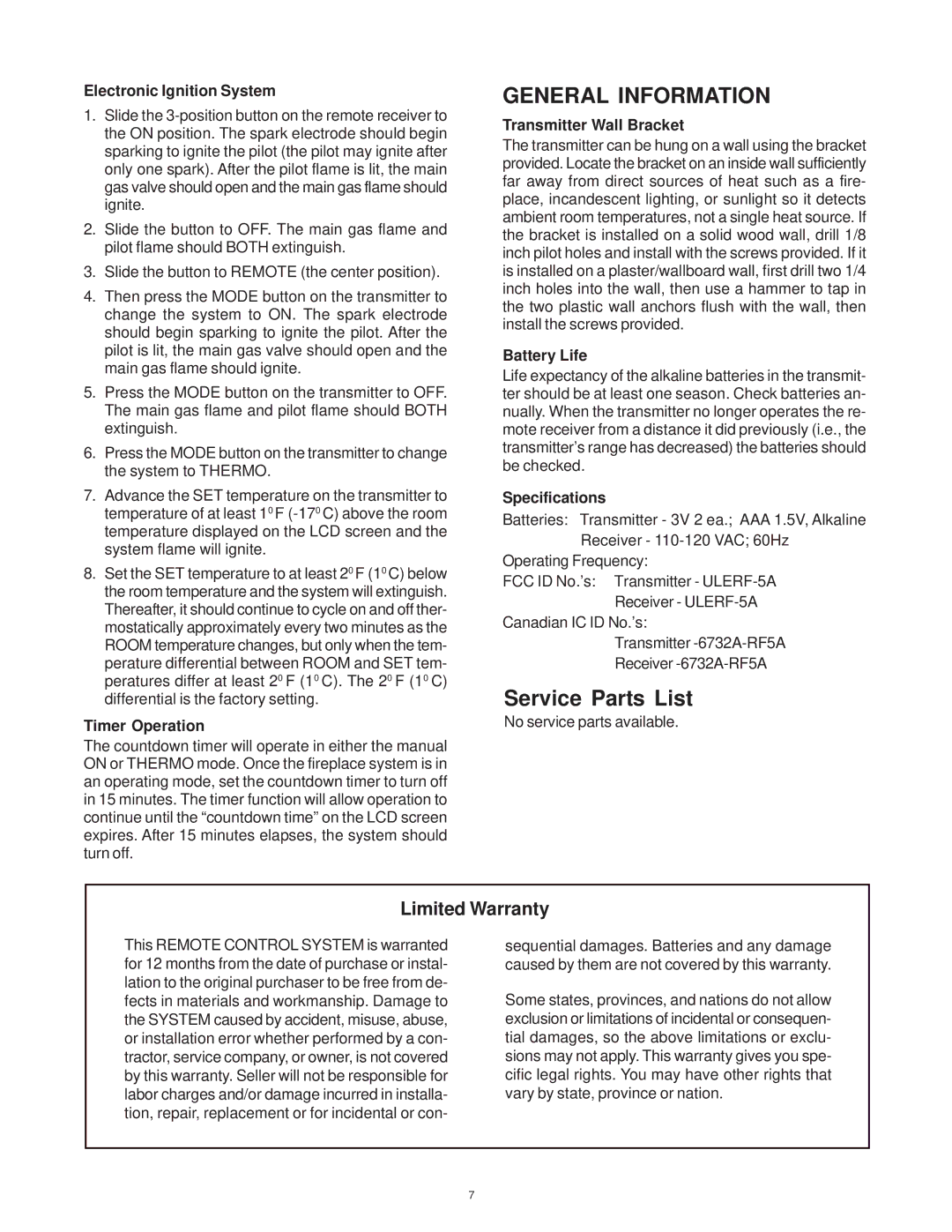
Electronic Ignition System
1.Slide the
2.Slide the button to OFF. The main gas flame and pilot flame should BOTH extinguish.
3.Slide the button to REMOTE (the center position).
4.Then press the MODE button on the transmitter to change the system to ON. The spark electrode should begin sparking to ignite the pilot. After the pilot is lit, the main gas valve should open and the main gas flame should ignite.
5.Press the MODE button on the transmitter to OFF. The main gas flame and pilot flame should BOTH extinguish.
6.Press the MODE button on the transmitter to change the system to THERMO.
7.Advance the SET temperature on the transmitter to temperature of at least 10 F
8.Set the SET temperature to at least 20 F (10 C) below the room temperature and the system will extinguish. Thereafter, it should continue to cycle on and off ther- mostatically approximately every two minutes as the ROOM temperature changes, but only when the tem- perature differential between ROOM and SET tem- peratures differ at least 20 F (10 C). The 20 F (10 C) differential is the factory setting.
Timer Operation
GENERAL INFORMATION
Transmitter Wall Bracket
The transmitter can be hung on a wall using the bracket provided. Locate the bracket on an inside wall sufficiently far away from direct sources of heat such as a fire- place, incandescent lighting, or sunlight so it detects ambient room temperatures, not a single heat source. If the bracket is installed on a solid wood wall, drill 1/8 inch pilot holes and install with the screws provided. If it is installed on a plaster/wallboard wall, first drill two 1/4 inch holes into the wall, then use a hammer to tap in the two plastic wall anchors flush with the wall, then install the screws provided.
Battery Life
Life expectancy of the alkaline batteries in the transmit- ter should be at least one season. Check batteries an- nually. When the transmitter no longer operates the re- mote receiver from a distance it did previously (i.e., the transmitter’s range has decreased) the batteries should be checked.
Specifications
Batteries: Transmitter - 3V 2 ea.; AAA 1.5V, Alkaline
Receiver -
FCC ID No.’s: Transmitter -
Canadian IC ID No.’s:
Transmitter
Service Parts List
No service parts available.
The countdown timer will operate in either the manual ON or THERMO mode. Once the fireplace system is in an operating mode, set the countdown timer to turn off in 15 minutes. The timer function will allow operation to continue until the “countdown time” on the LCD screen expires. After 15 minutes elapses, the system should turn off.
Limited Warranty
This REMOTE CONTROL SYSTEM is warranted | sequential damages. Batteries and any damage |
for 12 months from the date of purchase or instal- | caused by them are not covered by this warranty. |
lation to the original purchaser to be free from de- | Some states, provinces, and nations do not allow |
fects in materials and workmanship. Damage to | |
the SYSTEM caused by accident, misuse, abuse, | exclusion or limitations of incidental or consequen- |
or installation error whether performed by a con- | tial damages, so the above limitations or exclu- |
tractor, service company, or owner, is not covered | sions may not apply. This warranty gives you spe- |
by this warranty. Seller will not be responsible for | cific legal rights. You may have other rights that |
labor charges and/or damage incurred in installa- | vary by state, province or nation. |
tion, repair, replacement or for incidental or con- |
|
7
